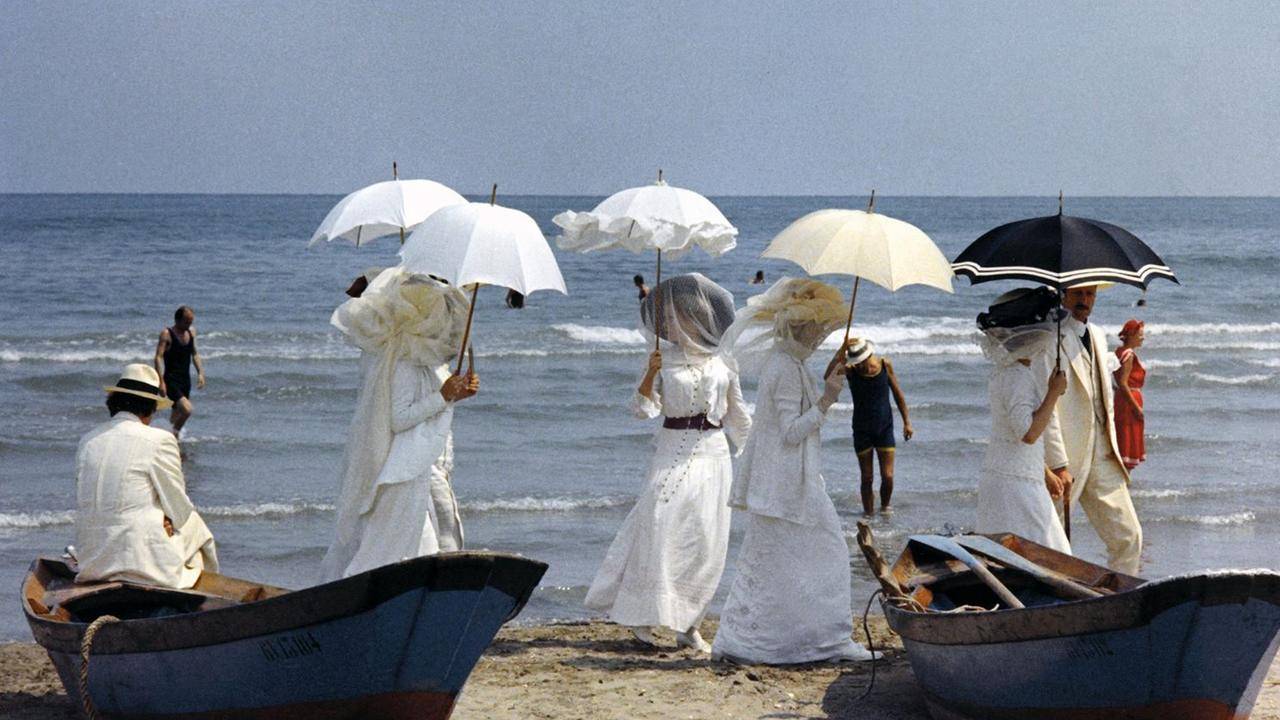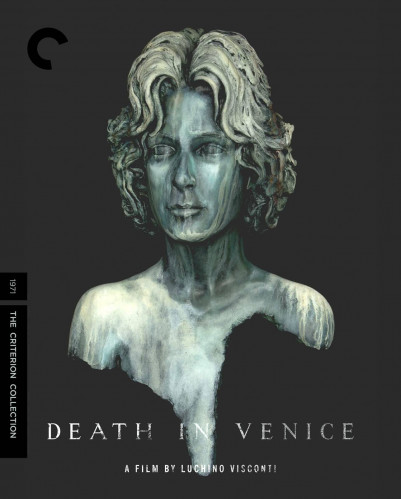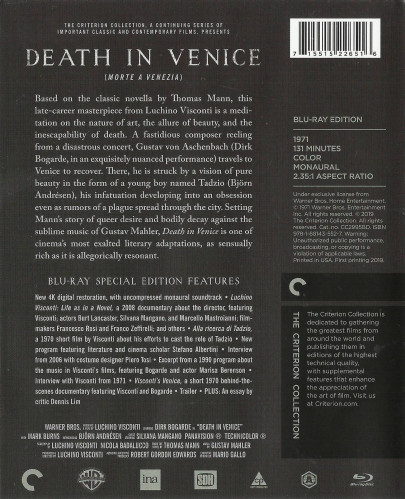DEATH IN VENICE [MORTE A VENEZIA] [1971 / 2019] [The Criterion Collection] [Blu-ray] [USA Release] A Celebrated Story of a Man Obsessed by Ideal Beauty!
Based on the classic novella by Thomas Mann, this late-career masterpiece from Luchino Visconti is a meditation on the nature of art, the allure of beauty, and the inescapability of death. A fastidious composer reeling from a disastrous concert, Gustav von Aschenbach [Dirk Bogarde], in an exquisitely nuanced performance, travels to Venice to recover. There, he is struck by a vision of pure beauty in the form of a young boy named Tadzio [Björn Andrésen], his infatuation developing into an obsession even as rumours of a plague spread through the city. Setting Thomas Mann’s story of queer desire and bodily decay against the sublime music of Gustav Mahler. ‘DEATH IN VENICE’ is one of cinema’s most exalted literary adaptations, as sensually rich as it is allegorically resonant.
The Criterion Collection is dedicated to gathering the greatest films from around the world and publishing them in editions of the highest technical quality. With supplemental features that enhance the appreciation of the art of film.
FILM FACT No.1: Awards and Nominations: 1971 Cannes Film Festival: Win: 25th Anniversary Prize for Luchino Visconti and also for his whole works. Nomination: Palme d'Or for Luchino Visconti. 1971 David di Donatello Awards: Win: Best Director (Migliore Regia) for Luchino Visconti. 1971 Golden Globes, Italy: Win: Best Film (Miglior Film) for Luchino Visconti. 1972 Academy Awards®: Nomination: Best Costume Design for Piero Tosi. 1972 BAFTA Film Awards: Win: Best Art Direction for Ferdinando Scarfiotti. Win: Best Cinematography for Pasqualino De Santis. Win: Best Costume Design for Piero Tosi. Win: Best Sound Track for Giuseppe Muratori and Vittorio Trentino. Nomination: Best Actor for Dirk Bogarde. Nomination: Best Direction for Luchino Visconti. Nomination: Best Film. 1972 Bodil Awards: Best European Film (Bedste europæiske film) for Luchino Visconti (director). 1972 French Syndicate of Cinema Critics: Win: Best Foreign Film for Luchino Visconti [Italy]. 1972 Italian National Syndicate of Film Journalists: Win: Best Director (Regista del Miglior Film) for Luchino Visconti. Win: Best Supporting Actress (Migliore Attrice Non Protagonista) for Silvana Mangano. Win: Best Costume Design (Migliori Costumi) for Piero Tosi. Win: Best Production Design (Migliore Scenografia) for Ferdinando Scarfiotti. Win: Best Cinematography (Migliore Fotografia) for Pasqualino De Santis. Nomination: Best Supporting Actor (Migliore Attore Non Protagonista) for Romolo Valli. 1972 Kinema Junpo Awards: Win: Best Foreign Language Film for Luchino Visconti. Win: Best Foreign Language Film Director for Luchino Visconti. 1972 National Board of Review, USA: Win: Top Ten Film. 1973 Sant Jordi Awards: Win: Best Foreign Film (Mejor Película Extranjera) for Luchino Visconti. 2011 Polish Film Awards: Nomination: Eagle Award: Best European Film (Najlepszy Film Europejski).
FILM FACT No.2: ‘DEATH IN VENICE’ is based on the novella “Death in Venice” and was first published in 1912 as “Der Tod in Venedig” by the German author Thomas Mann. The film's score was performed by the Orchestra dell'Accademia de Santa Cecilia, conducted by Franco Mannino, and subsequently released by EMI. In addition to the music of Gustav Mahler's Third and Fifth Symphonies which embodied the character and suffering of Gustav von Aschenbach [Dirk Bogarde], and director Luchino Visconti included a number of pieces from other composers.
Cast: Dirk Bogarde, Romolo Valli, Mark Burns, Nora Ricci, Marisa Berensonm Carole André, Björn Andrésen, Silvana Mangano, Leslie French, Franco Fabrizi, Antonio Appicella, Sergio Garfagnoli, Ciro Cristofoletti, Luigi Battaglia, Dominique Darel, Masha Predit, Eva Axén (uncredited), Marcello Bonini Olas (uncredited), Bruno Boschetti (uncredited), Nicoletta Elmi (uncredited), John Fordyce (uncredited), Massimo Foschi (voice) (uncredited), Giancarlo Giannini (voice) (uncredited), Karl Menzel (uncredited), Mirella Pamphili (uncredited) and Marco Tulli (uncredited)
Director: Luchino Visconti
Producers: Luchino Visconti, Mario Gallo and Robert Gordon Edwards
Screenplay: Luchino Visconti (screenplay), Nicola Badalucco (screenplay) and Thomas Mann (novel)
Composers: Gustav Mahler, Franz Lehár, Ludwig van Beethoven, Modest Mussorgsky and Armando Gill
Costume Designer: Piero Tosi
Cinematography: Pasqualino De Santis (Director of Photography)
Image Resolution: 1080p (Technicolor)
Aspect Ratio: 2.35:1 (Panavision)
Audio: English: 1.0 LPCM Mono Audio
Italian: 1.0 Dolby Digital Mono Audio
Subtitles: English
Running Time: 131 minutes
Region: Region A/1
Number of discs: 1
Studio: Warner Bros. / The Criterion Collection
Andrew’s Blu-ray Review: With the film ‘DEATH IN VENICE’ [1971] the question we all ask ourselves, what is true beauty? Is it what an artist might create or is it what we encounter with our senses? Composer Gustav von Aschenbach [Dirk Bogarde] travels to Venice to escape stress and seek artistic inspiration, the space to create. What he finds is an adolescent boy whose physical perfection so captivates him that he embarks on an obsessive pursuit destined to destroy him in the end. It's not often that a film's success is almost solely a result of its soundtrack, but that's certainly the case with the film ‘DEATH IN VENICE.’
The film is a brilliant adaptation of Thomas Mann's story of sexual obsession, and Luchino Visconti's film is bolstered by its glorious composed score of Gustav Mahler's third and fifth symphonies. Actor Dirk Bogarde leads the cast as the aging German composer Gustav von Aschenbach and becomes inexorably drawn to the fair-haired beauty of a young boy he sees at Venice hotel he is staying at.
Awestruck, Gustav von Aschenbach slowly becomes obsessed with the flirtatious youth Tadzio [Björn Andrésen], even extending his stay in the city despite the fact that a cholera epidemic has just broken out. As the mannered composer Gustav von Aschenbach turns in an exquisite performance, relying on actions rather than dialogue to capture the frail hesitancy of this old obsessed composer.
Dismissing hotel staff and porters with a flick of his wrist, gazing longingly at the young boy's figure and forever padding his face with a handkerchief, Dirk Bogarde's consumptive hero is perfectly suited to the crumbling decadence of the Venetian locations.
Former matinée idols Dirk Bogarde and Silvana Mangano increased their standing with art house audiences after this sumptuous adaptation of Thomas Mann's novella. Director Luchino Visconti was a master of colour composition and here he has created a haunting work that is as operatic as it is cinematic. It is perhaps too sedate in places, but Pasquale De Santis's shimmering cinematography more than compensates completely.
‘DEATH IN VENICE’ is a film of obsessive watching. The camera lens are a pair of eyes scanning the panorama of the seaside hotel in which it takes place, where the lobby, dining hall, and the beach of luxurious lounging beneath sun hats galore. Thomas Mann’s uncovered letters and diaries that revealed a frustrated male homosexual with longing desires. In terms of set design, film locales, costume and meticulous historical detail, more than a few critics muttered ominously regarding ‘decadence’ and ‘style over substance’ of the film. This was especially the case amongst some (although not all) of his fellow travellers on the left of Italian politics. Similarly, director Luchino Visconti was adamant that costume, set design and the score were suited entirely and uniquely to the film.
Director Luchino Visconti's ‘DEATH IN VENICE’ is a masterpiece of utterly haunting beauty that will capture the imagination of anyone interested in the screen's capacity for breath-taking images. It is a poignant tragedy based on Thomas Mann's classic novella of the same name. Visconti has captured many of the essential qualities of the book and employed a superb visual style with the brilliant and great cinematographer Pasqualino De Santis. It is about the struggle within the soul of a man, Gustav von Aschenbach, a composer vacationing in the Venice of 1911.
The ending of the film ‘DEATH IN VENICE’ is totally unforgettable, where Gustav von Aschenbach languishing on the beach in the deckchair, and the Polish folk song in the background, where the young man Tadziu is in the sea turning into an angelic apparition with extended hand. I cannot imagine a better end to the film ever being made of Thomas Mann's great and essential novella work. Overwhelming!
DEATH IN VENICE MUSIC TRACK LIST
Sehr Langsam Misterioso from Symphony No.3 (Written by Gustav Mahler) (Conducted by Franco Mannino) [Performed by The Orchestra of the Academy of Saint Cecilia]
Adagietto from Symphony No.5 (Written by Gustav Mahler) (Conducted by Franco Mannino) [Performed by The Orchestra of the Academy of Saint Cecilia]
Lippen schweigen / Merry Widow Waltz (uncredited) (Written by Franz Lehár) [Scene before dinner; where Gustav von Aschenbach sees Tadzio for the first time]
Für Elise (uncredited) (Written by Ludwig van Beethoven) [Performed by Claudio Gizzi]
Wiegenlied (uncredited) (Written by Modest Mussorgsky) [Performed by Masha Predit]
Neue Lieder (Wer Bei Den Frauen Glück Haben Will) (uncredited) (Written by Armando Gill)
* * * * *
Blu-ray Image Quality – The Criterion Collection presents us with a beautiful and evocative 1080p image and is enhanced with a Panavision anamorphic 2.35:1 aspect ratio. This is a really terrific restored visual effort was on the part of the L’lmmagine Ritrovata laboratory, Cincenta di Bologna, the Istituto Luce, Cinecittà and collaboration with Warner Bros., and has produced a new digital image transfer that was created in a 16-bit 4K resolution camera negative, and one which really brings the film’s beautiful visuals to life, thanks to a source print that is in tremendous condition and luckily the grain is never a problem with this treatment. To resume the light, the colours and the nuances was sought by Luchino Visconti and created by Pasqualino De Santis and the colour correction was supervised by Marco Pontecorvo, DoP and De Santis. The colours really wash across the screen, from the bright blues to the crisp whites. The hues remain bright and pastel in shade, but when more vivid colours are needed, the transfer really comes to life, which helps to give no trouble to the contrast either. So all in all, this is another impressive title presentation from The Criterion Collection and Warner Bros.
Blu-ray Audio Quality – The Criterion Collection brings us a wonderful 1.0 LPCM Mono Audio experience that was remastered by Cincenta di Bologna from the 35mm magnetic track. The composed film music adds to the ambient atmosphere of the film that was at most part conducted by Franco Mannino [Italian film composer]. The dialogue was also presented really well and was very clear and easy to understand. Because the audio track is Mono, it is not as dynamic as if it had been stereo, but one which handles the sounds really well and is also well-presented and the visual and audio presentation together is very well balanced.
* * * * *
Blu-ray Special Features and Extras:
Special Feature: Luchino Visconti: Life As In A Novel [2008] [480i] [1.37:1] [55:07] With this featurette we get to view a unique documentary about the career of director Luchino Visconti, and featuring new and archival interviews. It has lots of insights, and the documentary is an essential view for fans of the film. They talk a great deal about the history of director Luchino Visconti, and informs us that he was born to a Milanese noble family, Luchino Visconti explored artistic proclivities from an early age, working as an assistant to director Jean Renoir. Luchino Visconti 1943 directorial debut was the film ‘Ossessione,’ and was condemned by the Fascist regime for its unvarnished depictions of working-class characters resorting to criminality, but is today renowned as a pioneering work of the Italian cinema. Luchino Visconti best-known films include ‘Senso’ [1954] and ‘The Leopard’ [1963] and both were historical melodramas based on Italian literary classics, as well as the gritty drama ‘Rocco and His Brothers’ [1960], ‘The Damned’ [1969], ‘DEATH IN VENICE’ [1971] and ‘Ludwig’ [1973]. Luchino Visconti was also an accomplished stage director of plays and opera, both in Italy and abroad. It is also split up into different categories and they are as follows: Influences; Art and Politics; Maestro; Opera; Class concerns; The German trilogy and No compromises. This was a FELIX FILM presentation. Contributors include: Luchino Visconti [Director], Burt Lancaster [American actor], Jean Marais [French actor], Giuseppe De Santis [Italian Filmmaker], Luigi Filippo D'Amico [Italian Filmmaker], Francesco Rosi [Italian Filmmaker], Claudio Forges Davanzati [Production Manager], Franco Zeffirelli [Italian Filmmaker], Marcello Mastroianni [Italian film actor], Hans Werner Henze [German composer], Franco Mannino [Italian film composer], Alain Delon [French actor], Giuseppe Rotunno [Italian cinematographer], Silvana Mangano [Italian actress] Nathalie Bielfeldt and Enrico Medioli [Italian screenwriter]. Italian with white English subtitles.
Special Feature: Showing The Story: Luchino Visconti and ‘DEATH IN VENICE’ [2018] [1080p] [2.35:1 / 1.78:1] [23:56] With this featurette program we get to view an interview conducted by The Criterion Collection in 2018. The interview features Stefano Albertini who is Clinical Professor of Italian literature and cinema at the New York University and he discusses the context of ‘DEATH IN VENICE’ within Italian culture at the time, as well as the career and themes of director Luchino Visconti. Exploring these themes with great attention to detail, and Stefano Albertini provides a very rewarding insight on all aspects of Luchino Visconti and especially informing us that the director had a very complicated and conflicting lifestyle, especially being a closeted homosexual and who hated the word “Gay” and would not allow you to say that word in front of him, and also about his sexuality.
Special Feature: Making The Film: Here we get to view five unique featurettes and they are as follows:
Alla Ricerca Di Tadzio [In Search of Tadzio] [1970] [480i] [1.37:1] [30:26] With this featurette program by The Criterion Collection, we get to view a television documentary where we follow director Luchino Visconti with his travels all over Europe with auditions in search for a young actor to portray the role of Tadzio in Luchino Visconti dream project and especially with his adaptation of the Thomas Mann's novella “Death in Venice,” and finally choosing the young Swedish actor Björn Andrésen. Italian with white English subtitles.
Memorie del Cinema Italiano [Talking About Italian Cinema] [2006] [480i] [1.37:1] [19:26] With this featurette we get presented an interview with costume designer Piero Tosi and recalling his work on the film ‘DEATH IN VENICE.’ We also get an insight into the production of the film as well as the landscape of Italian cinema. Piero Tosi talks about on how he wanted to become a costume designer that related to his love of cinema, but also talks about problems he encountered with other directors, but also informs us the ‘DEATH IN VENICE’ was his most favourite film to work on. Italian with white English subtitles.
Musiques Au Cœur [1990] [480i] [1.37:1] [8:14] With this featurette we are presented with a very short excerpt from a France 2 broadcast, that aired on 13th May, 1990 and features actors Dirk Bogarde and Marisa Berenson discussing the filmmaker Luchino Visconti and his use of the work of composer Gustav Mahler in the film ‘DEATH IN VENICE.’ This short French television broadcast, emphasizes the importance of music as a key filmmaking tool. This is a worthwhile supplemental featurette for all film enthusiasts. French with white English subtitles.
Visconti À Propos De Mort À Venise [1971] [480i] [1.37:1] [3:00] With this featurette we are presented with a short segment from the French news program from the Midi Magazine, that was broadcast on the 2nd June, 1971, and showcases director Luchino Visconti discussing the themes, controversies, and the reception of the film ‘DEATH IN VENICE.’ Though the piece is very short there are some interesting insights into the director's views on the film's story.
Visconti's Venice [1970] [480i] [1.37:1] [9:00] With this featurette we are presented with a short behind-the-scene documentary produced during the original release of the film. The promotional piece features interviews with director Luchino Visconti and actor Dirk Bogarde and was made to promote the film ‘DEATH IN VENICE’ and showcases Luchino Visconti’s painstaking attention to detail, especially with some scenes Luchino Visconti demands that a particular scene had to have five takes to get that perfect shot. This was a Warner Bros. presentation.
Theatrical Trailer [1971] [1080p] [2.35:1] [3:50] This is the Original Theatrical Trailer for the film ‘DEATH IN VENICE.’
BONUS: Here we are presented with an in-depth essay by critic Dennis Lim and entitled RUINOUS INFATUATION. Dennis Lim is the director of programming at the Film Society of Lincoln Center. Dennis Lim was the film editor of the Village Voice from 2000 – 2006, and was also a regular contributor to The New York Times from 2006 – 2013, and Dennis Lim has also written for The Los Angeles Times, Artforum International, and Cinema Scope, among other publications. Dennis Lim is currently a Visiting Lecturer in the Department of Visual and Environmental Studies at Harvard. Dennis Lim is the author of the book entitled “David Lynch: The Man From Another Place” that was published by Amazon/New Harvest in 2015.
PLUS: The new ‘DEATH IN VENICE’ Blu-ray Cover was designed by Cliff Wright who has illustrated numerous books, specializing in illustrations of animals and children's books.
Finally, the film ‘DEATH IN VENICE’ divided critics, but was loved by many viewers, especially for Dirk Bogarde’s brilliant performance as the elderly and dying German composer Gustav von Aschenbach, and also for its lavish production values, especially the glorious cinematography and costume design, which garnered an Oscar nod for Piero Tosi. Director Luchino Visconti was always keen to draw from literary and historical sources for his filmmaking themes and ‘DEATH IN VENICE’ was a loose version of Thomas Mann’s novella, so ensuring that this film contained literary rhythms, nuances of tone and dextrous language, all of which remained rooted in the environment being depicted. Very Highly Recommended!
Andrew C. Miller – Your Ultimate No.1 Film Aficionado
Le Cinema Paradiso
United Kingdom



